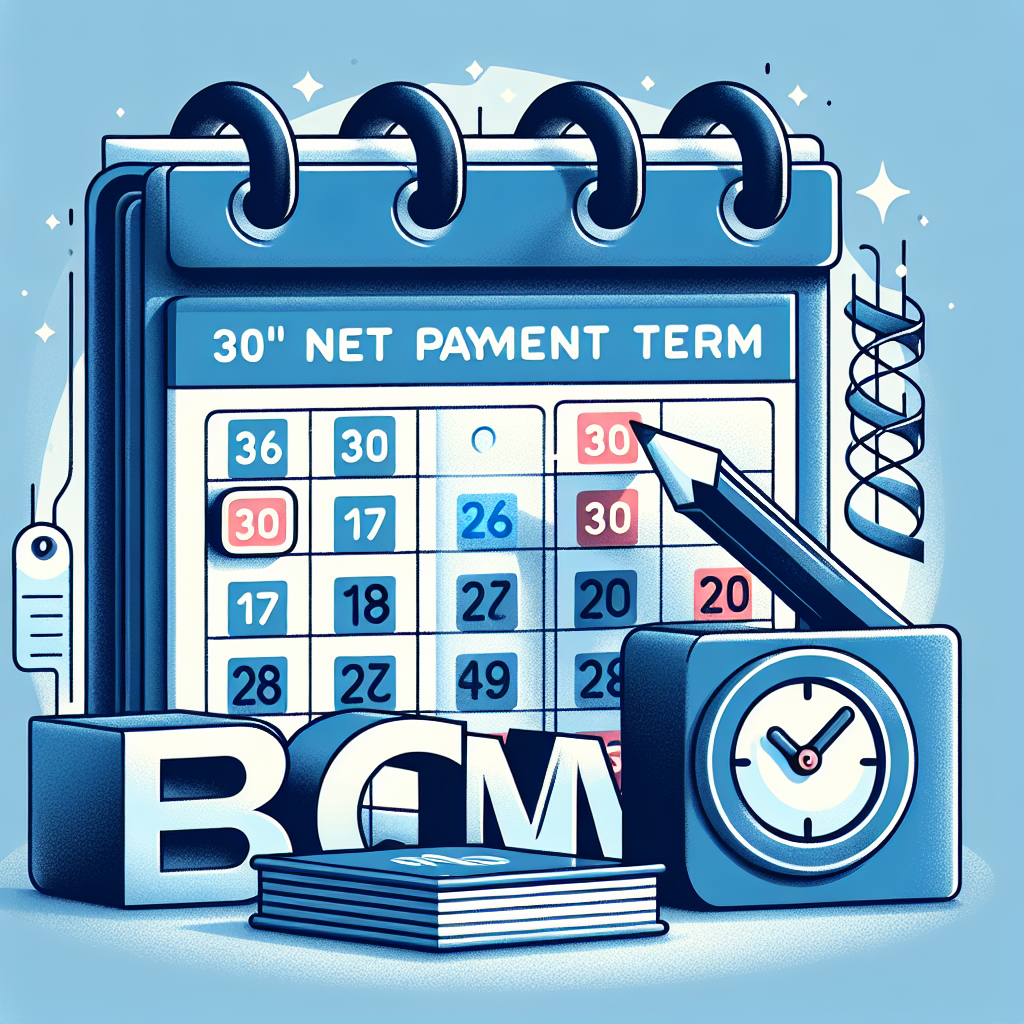In the fast-paced and competitive world of business, managing cash flow effectively is not just an operational necessity—it is a strategic imperative. Essential to this process is robust Billing Cycle Management (BCM), ensures that invoices are accurate, sent out in a timely manner, and tracked religiously until payment is secured
Net 30 payment terms, a common credit arrangement allowing businesses 30 days to settle invoices, play a pivotal role in building business credit. This flexible tool is an integral part of effective BCM, offering strategic advantages for managing cash flow and establishing a strong credit profile.
Offering Net 30 can enhance customer loyalty, boost sales potential, and facilitate better cash flow forecasting, provided it is underpinned by strong billing management practices.
Moreover, selecting the right Net 30 vendor, such as The CEO Creative, can elevate a company’s financial well-being while streamlining operations, allowing businesses to focus on their core competencies and paths to success.
Let’s explore the symbiotic relationship between effective BCM and the strategic application of Net 30 terms, and how the right partnerships can significantly influence your organization’s financial health and operational efficiency.
Understanding Net 30 and Its Benefits
Net 30, a common term in business agreements, offers a 30-day timeframe for customers to pay their invoices in full. This practice, acting as a short-term credit line, provides several tangible benefits for both the vendor and the customer, including fostering stronger relationships, boosting potential sales, and allowing for more accurate financial forecasting.
Flexibility and Customer Loyalty
By implementing Net 30 terms, businesses show trust in their customers, which can significantly enhance customer satisfaction and loyalty. This flexibility can lead to longer, more fruitful relationships, as customers appreciate the trust and confidence placed in them by vendors. This mutual respect can be a foundational pillar of long-term business partnerships, as customers are more likely to return to vendors who understand and accommodate their financial timing needs.
Increased Sales Potential
Net 30 can serve as a catalyst for increased sales. Customers may be more inclined to make larger purchases or order more frequently if they know they have the buffer of a 30-day payment period. This arrangement can effectively encourage purchases by reducing immediate financial pressure on the customer, making it an attractive option for those who may not have the capital upfront but anticipate funds becoming available within the payment period.
Improved Cash Flow Forecasting
While it may seem counterintuitive, offering Net 30 can actually assist businesses in better predicting their cash flow because it establishes a clear timeline for when receivables are expected. Although this doesn’t equate to immediate cash in hand, the predictability of income streams within a set duration aids in financial planning. Companies can more accurately forecast and manage their cash flow, making strategic business decisions more grounded in financial reality.
The Synergy between Billing Management and Net 30
Effective Billing Cycle Management (BCM) and Net 30 work hand in hand to optimize a business’s financial operations. Through meticulous invoicing, diligent tracking, and the leveraging of financial data, a robust BCM system lays the groundwork for a successful Net 30 strategy.
Accurate and Timely Invoicing
The very core of BCM involves ensuring all invoices are not only accurate but also delivered on time. With Net 30 specifically, the invoicing process begins the 30-day countdown, necessitating prompt distribution to avoid payment delays. Accurate invoicing prevents disputes and potential delays, acting as the cornerstone for smooth financial operations and strengthened customer trust.
Efficient Tracking and Collections
A sophisticated BCM system is vital for efficiently tracking outstanding invoices and managing collections. Utilizing automated reminders before and after the due date nudges customers toward timely payment without straining the relationship. For invoices that do fall past due, a systematic collections process steps in, offering a clear procedure for resolving outstanding payments while maintaining professionalism.
Data-Driven Decision Making
The insights garnered from BCM reporting tools empower businesses to make informed decisions regarding their Net 30 terms. By analyzing patterns in payment behaviors, businesses can identify consistent late payers and adjust their credit terms accordingly. This data-driven approach allows for a proactive stance on managing receivables, cash flow optimization, and minimizing financial risk.
By implementing strategic billing cycle management and leveraging the benefits of Net 30 terms, businesses can foster stronger customer relationships, expand sales opportunities, and enhance their financial forecasting.
The collaboration between precise invoicing, effective tracking, and informed decision-making facilitates a sustainable and financially sound business model. This synergy does not only uphold operational efficiency but also fortifies the foundation for sustained business growth and financial success.
The Role of Net 30 Vendors in Enhancing BCM
Net 30 vendors play a pivotal role in enhancing Billing Cycle Management (BCM) by providing businesses with the tools and capabilities needed to manage their billing cycles more effectively. By leveraging the services of Net 30 vendors, businesses can achieve better cash flow management, streamline their operations, reduce risks associated with accounts receivable, and gain valuable insights into their customers’ creditworthiness.
Simplified Cash Flow
One of the primary benefits of partnering with a Net 30 vendor is the simplification of cash flow. Net 30 vendors can offer businesses immediate access to cash by purchasing outstanding invoices, allowing businesses to bypass the standard 30-day wait for customer payments. This can significantly increase working capital, providing businesses with the funds needed to cover operational expenses, invest in growth opportunities, or mitigate unexpected financial challenges. Immediate access to funds supports business continuity and financial stability.
Streamlined Operations
Net 30 vendors also contribute to streamlined operations. By handling invoice collections on behalf of businesses, Net 30 vendors free up internal resources, allowing businesses to focus on core activities and revenue-generating tasks. This reallocation of resources leads to increased efficiency and productivity, as businesses can concentrate on what they do best without being bogged down by the time-consuming process of chasing payments. Streamlining operations in this manner can drive business growth and improve the overall bottom line.
Reduced Risk
Mitigating the risk of late payments is another critical advantage of partnering with Net 30 vendors. These vendors take on the responsibility of managing and collecting overdue invoices, protecting businesses from the adverse impacts of unexpected payment delays.
By safeguarding cash flow from disruptions, Net 30 vendors offer businesses a layer of financial security and stability, ensuring more predictable and reliable revenue streams. This reduced risk allows businesses to plan more effectively for the future and make strategic investments with confidence.
Creditworthiness Insights
Furthermore, Net 30 vendors often provide tools and resources to help businesses evaluate the creditworthiness of their customers before extending Net 30 terms. These credit assessment capabilities allow businesses to make informed decisions regarding credit policies, manage their accounts receivable more proactively, and minimize the risk of non-payment.
Through detailed insights into customer payment behaviors and trends, businesses can optimize their credit and collections strategies, ensuring a healthier balance sheet.
Choosing the Right Net 30 Vendor

Selecting the appropriate Net 30 vendor is crucial to achieving the benefits mentioned above. When evaluating potential vendors, businesses should consider several factors to ensure a fruitful partnership that enhances their BCM efforts.
Fee Structure
Understanding the fee structure of a Net 30 vendor is vital. Businesses should look for transparent pricing and fee schedules that align with their financial goals. It’s crucial to evaluate the cost-effectiveness of partnering with the vendor, ensuring that the services offered justify the fees. Transparent and fair pricing without hidden charges fosters a mutually beneficial relationship between businesses and their Net 30 vendors.
Invoicing Flexibility
Invoicing flexibility is another critical factor to consider. The chosen Net 30 vendor should offer invoicing terms and schedules that fit seamlessly with a business’s existing billing cycles. This ensures a smooth integration of services, helping to maintain consistent cash flow and avoid any mismatches in financial planning. The right vendor will understand the unique invoicing needs of a business and provide adaptable solutions accordingly.
Industry Specialization
Vendors with industry specialization can offer tailored services that cater specifically to the unique needs and challenges of a business’s sector. A vendor experienced in a particular industry will possess a deeper understanding of that business landscape, allowing them to offer more relevant and effective solutions. Businesses should seek out Net 30 vendors with a proven track record in their industry to leverage specialized expertise and insight.
Reputation and Customer Service
Lastly, the reputation and quality of customer service provided by a Net 30 vendor are paramount. Businesses should research the vendor’s track record, seeking feedback from current and past clients to gauge the vendor’s reliability and effectiveness.
A vendor known for excellent customer support, responsiveness, and a dedication to helping businesses succeed is an invaluable partner in optimizing BCM processes and achieving financial success.
The CEO Creative Advantage: BCM Integration

The CEO Creative, as a Net 30 vendor, offers significant benefits through its integration with Billing Cycle Management (BCM) processes. By aligning itself closely with the needs and cycles of businesses, The CEO Creative promises not just a service but a partnership aimed at optimizing operations and enhancing financial health.
Flexible Invoicing Terms
Understanding the uniqueness of each business’s billing cycle is crucial. The CEO Creative rises to the occasion by providing flexible invoicing terms that align with your specific schedules. This adaptability serves to reduce friction, optimize cash flow, and ensure a harmonious integration with your existing BCM processes. By eliminating the “one size fits all” approach and offering tailored invoicing schedules, The CEO Creative helps businesses maintain smooth financial operations.
Data Sharing and Insights
Partnering with The CEO Creative opens up a wealth of customer payment trends and behaviors, essential for refining credit policies and optimizing collection strategies. With access to valuable data provided by The CEO Creative, businesses can integrate these insights into their BCM system, making more informed decisions and proactively managing financial risks. This data-driven approach empowers companies to identify patterns, anticipate challenges, and act decisively.
Collections Support
The daunting task of chasing overdue payments can consume significant resources. The CEO Creative steps in to offer collections support, alleviating the burden on your team. This assistance not only frees up internal resources but also improves the success rate of collecting outstanding payments. With The CEO Creative handling the intricacies of collections, businesses can redirect their focus towards growth and core operations.
Advanced Strategies for BCM and Net 30 Optimization
Adopting a sophisticated approach to Billing Cycle Management and the strategic use of Net 30 terms can propel a business toward greater financial stability and success. Here are several advanced strategies to consider:
Customer Credit Checks
Before extending Net 30 terms, it’s prudent to conduct thorough credit checks on potential clients. This step allows businesses to gauge creditworthiness, reducing the risk of defaults. By identifying high-risk clients early, you can tailor your credit policies to minimize exposure and protect your cash flow.
Communication and Transparency
Clarity in communication about payment expectations and the consistent use of automated reminders can bolster trust with clients, encouraging prompt payment. Transparency throughout the invoicing and payment process fosters a proactive environment, reducing misunderstandings and delays.
Flexible Payment Arrangements
For clients with a solid payment history, showing flexibility in payment arrangements can reinforce goodwill and loyalty. Offering occasional extensions or tailoring terms to individual circumstances demonstrates a commitment to partnership and understanding, potentially safeguarding long-term business relationships.
Early Payment Incentives
Motivating clients to settle their accounts early can significantly accelerate cash flow. Incentives such as discounts for payments made within a specific period (e.g., “2/10, Net 30”) not only reward prompt payment but also enhance the predictability of your financial planning.
By implementing these advanced strategies, businesses can finely tune their Billing Management and Net 30 practices, fostering a healthier financial ecosystem. Success in these areas demands a blend of proactive risk management, clear communication, and strategic incentives — all aimed at optimizing operations and achieving financial success.
Whether it’s through leveraging technology for automation, engaging in detailed customer credit assessments, or nurturing transparent client relationships, each strategy contributes to a robust framework for managing billing cycles and Net 30 accounts efficiently. With these practices, businesses are well-positioned to maintain a steady and predictable cash flow, ultimately paving the way for growth and sustainability.
The Impact of BCM on Business Growth
 Image courtesy: Unsplash
Image courtesy: Unsplash
The intricate dance between effective Billing Cycle Management (BCM) and a business’s growth potential cannot be understated. In the realm of finance and operations, BCM stands out not only as a fundamental operational task but as a strategic asset contributing significantly to a company’s ability to expand, adapt, and thrive in competitive markets. Let’s dissect how adept management of billing cycles propels businesses forward.
Fueling Cash Flow and Financial Stability
Cash flow, the very lifeblood of any business, dictates its health and agility. A well-oiled BCM system ensures that invoices go out timely and accurately, thereby accelerating the payment process and maintaining a steady influx of cash. This reliability in cash flow is crucial for everyday operations, from covering overhead expenses to investing in growth opportunities.
Essentially, BCM acts as a safeguard, providing the financial stability needed to navigate both lean and boom periods without compromising on strategic initiatives.
Enhancing Customer Relationships Through Flexible Payment Terms
The strategic offering of Net 30 terms, a facet of BCM, plays a pivotal role in nurturing and strengthening customer bonds. By extending them the courtesy of time to manage their resources effectively, a business demonstrates trust and understanding, fostering loyalty and encouraging repeat transactions. This aspect of BCM not only aids in client retention but also positions a company as a preferred partner, facilitating customer acquisition and contributing to business growth.
Driving Operational Efficiency and Productivity
The automation and optimization inherent in contemporary BCM systems streamline the billing process, reducing manual efforts and minimizing errors. This enables teams to focus on core functions and revenue-generating activities rather than getting bogged down in administrative tasks.
Moreover, by partnering with Net 30 vendors, businesses can further offload the burden of collections and financial risk management, optimizing operational efficiency and gearing towards scalability.
Informing Decision-Making and Strategy with Data Insights
BCM systems, especially when integrated with solutions from Net 30 vendors, provide a wealth of data and insights. This intelligence can be instrumental in shaping strategies around credit management, customer engagement, and even product or service offerings.
Businesses can identify patterns, such as which clients consistently pay on time and which pose higher risks, enabling tailored approaches that maximize profitability and mitigate losses. Such data-driven decisions fuel more informed strategic planning, laying the groundwork for sustained growth.
Conclusion
Effective billing cycle management (BCM) and strategic use of Net 30 terms are foundational elements for achieving financial success and fostering sustainable growth in today’s competitive business environment.
The interconnectedness between BCM and Net 30 cannot be overstated—with each playing a crucial role in cash flow optimization, enhancing customer relationships, and improving operational efficiency.
Partnering with the right Net 30 vendor, like The CEO Creative, can significantly enhance your BCM strategy. Such partnerships not only streamline operations by offering immediate access to funds and reducing the administrative burden of collections but also provide valuable insights into customer payment behaviors and creditworthiness.
To maximize the benefits of BCM and Net 30, businesses should consider the following strategies:
– Accurate and Timely Invoicing: Ensures that customers are well-informed and the payment clock starts as intended.
– Efficient Tracking and Collections: Helps manage and mitigate the risks associated with late payments.
– Data-Driven Decision Making: Informs credit policies, optimizes collection strategies, and overall financial planning.
– Customer Credit Checks: Before extending Net 30 terms, assess the creditworthiness of potential clients to reduce default risk.
– Communicate Proactively: Maintain transparency about payment expectations and provide regular reminders as the due date approaches.
– Offer Flexible Arrangements and Early Payment Incentives: Encourage timely payments and foster customer goodwill.
In conclusion, sound billing cycle management coupled with carefully managed Net 30 arrangements sets the stage for a vibrant, financially healthy business. While the optimal tactics may vary depending on industry and business model, the core principles remain the same: prioritize accuracy, efficiency, and strategic partnerships. By doing so, you not only safeguard your cash flow but also create a platform for enduring growth and prosperity.






